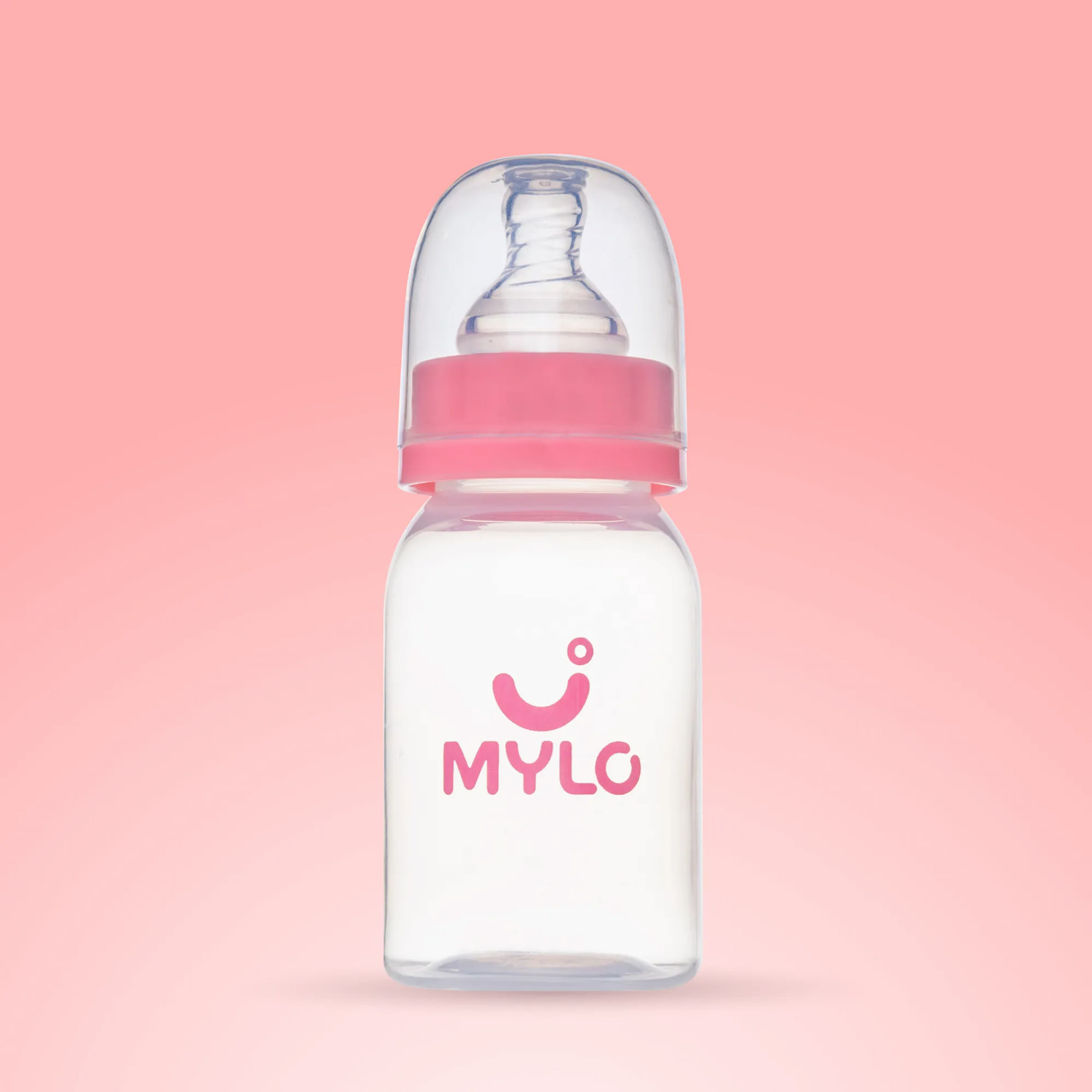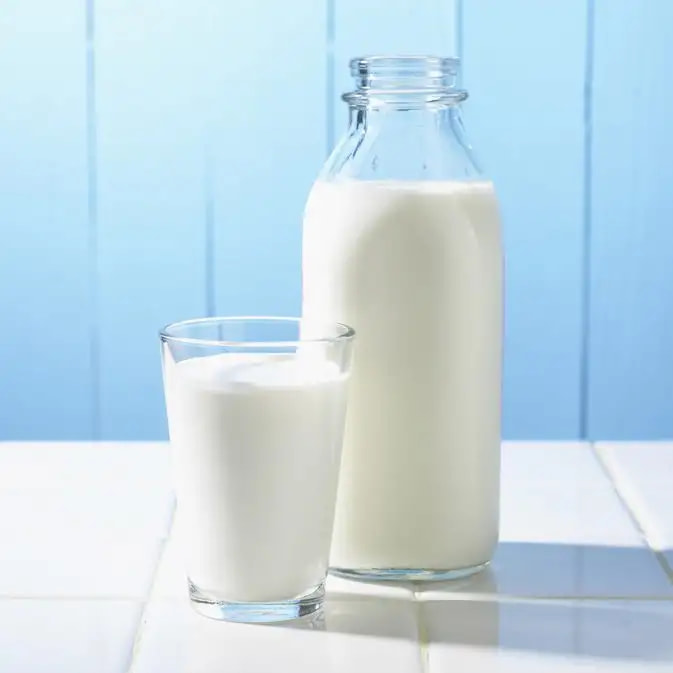Home

Feeding

When Are Babies Able To Begin Consuming Cow's Milk?
In this Article

Feeding
When Are Babies Able To Begin Consuming Cow's Milk?
Updated on 3 November 2023
Cow milk has long been a staple in many diets, but is it appropriate for infants? Cow milk for a newborn baby is not recommended. It is recommended that babies begin consuming cow milk after they turn one. Before this age, cow milk for newborn babies does not provide the right balance of nutrients for a baby's growth and development. Cow milk for baby can be difficult to digest and may lead to stomach discomfort or allergic reactions.
Cow milk for babies is not recommended as a primary source of nutrition. Breast milk or formula is preferred during the first 12 months of a newborn. Cow's milk does not provide enough iron and other essential nutrients for infants and can also put them at risk for digestive discomfort and allergies.
Many paediatricians suggest introducing cow's milk as a complementary food around 12 months after other solid foods have been introduced and tolerated well. However, it is essential to discuss this with the child's doctor before introducing cow's milk or any new food in babies diet.
One of the questions that arise is if cow milk is good for a 1-month baby. The digestive system of a one-month-old baby is not fully developed and may not be able to handle cow milk properly. Cow milk has higher levels of protein and minerals, which can strain a baby's immature kidneys.
Can Babies Have Cow's Milk?
Babies can have cow's milk, but it should not be their primary source of nutrition until they are at least one year old. Breast milk or formula is the preferred option for infants, and alternative kinds of milk such as almond, rice, or soy can also be used as substitutes until cow's milk is introduced. Parents should always consult their child's doctor before introducing cow's milk. Babies are vulnerable and may have trouble digesting cow's milk before they grow older.
At What Age Can Baby Start Drinking Cow's Milk?
According to the American Academy of Pediatrics, cow milk for newborn babies should not be given as a primary drink until the infant is at least 12 months old. Before that age, a baby's digestive system is not developed enough to break down the proteins in cow's milk properly.
Babies who consume cow's milk before 12 months may also be at a higher risk for iron deficiency anaemia.
How To Start Cow's Milk For Babies?
The best way to introduce cow's milk is to mix it with breastmilk or formula and gradually increase the amount of cow's milk over time. This allows the baby's digestive system to adjust and reduces the risk of stomach discomfort or allergic reactions.
It is also essential to introduce cow's milk as part of a well-rounded diet, offering the right foods for a child's age and stage of development.
Why Formula And Not Cow's Milk?
Cow's milk does not have the right balance of nutrients for a baby's rapidly growing and developing body. Baby formula, on the other hand, has added minerals, vitamins, and fats that babies need. So, formula is better than cow's milk for infants.
What If I Can't Find Formula?
If a person can't find formula for their baby, the AAP recommends using properly prepared, iron-rich infant cereals as a substitute. Cow's milk should never be used as a substitute for formula or cereal, as it does not provide the necessary nutrients for a baby's growth and development. If needed, goat's milk can be used, but it should also be prepared appropriately and introduced after 12 months.
When Do You Stop Formula?
After 12 months, a baby can begin transitioning to whole cow's milk as their primary source of nutrition. However, formula or other milk alternatives can still be used until age 2, as cow's milk does not provide enough vitamin D and iron for toddlers. Parents should keep an eye out for any signs of discomfort in the infant and stop cow's milk if necessary.
Conclusion
Cow's milk can be introduced to babies at 12 months or older as part of a well-rounded diet. However, it should never replace breastmilk or formula as infants' primary source of nutrition. Cow milk for baby must also be properly prepared and given in moderation to reduce the risk of digestive discomfort or health issues. Parents should always consult their child's doctor before introducing cow's milk.

2-in-1 Baby Feeding Sipper Bottle (Pink) - 125 ml
BPA Free with Anti-Colic Nipple | Feels Natural Baby Bottle | Easy Flow Neck Design
₹ 120

4.3
(8508)


7701 Users bought



Written by
Mylo Editor
Official account of Mylo Editor
Read MoreGet baby's diet chart, and growth tips

Related Articles
RECENTLY PUBLISHED ARTICLES
our most recent articles

Diet & Nutrition
গর্ভাবস্থায় আলুবোখরা: উপকারিতা ও ঝুঁকি | Prunes During Pregnancy: Benefits & Risks in Bengali

Diet & Nutrition
গর্ভাবস্থায় হিং | ঝুঁকি, সুবিধা এবং অন্যান্য চিকিৎসা | Hing During Pregnancy | Risks, Benefits & Other Treatments in Bengali

Women Specific Issues
স্তনের উপর সাদা দাগ: লক্ষণ, কারণ এবং চিকিৎসা | White Spots on Nipple: Causes, Symptoms, and Treatments in Bengali

Diet & Nutrition
গর্ভাবস্থায় পোহা: উপকারিতা, ধরণ এবং রেসিপি | Poha During Pregnancy: Benefits, Types & Recipes in Bengali

Diet & Nutrition
গর্ভাবস্থায় মাছ: উপকারিতা এবং ঝুঁকি | Fish In Pregnancy: Benefits and Risks in Bengali

Diet & Nutrition
গর্ভাবস্থায় রেড ওয়াইন: পার্শ্ব প্রতিক্রিয়া এবং নির্দেশিকা | Red Wine During Pregnancy: Side Effects & Guidelines in Bengali
- ইনার থাই চ্যাফিং: কারণ, উপসর্গ এবং চিকিৎসা | Inner Thigh Chafing: Causes, Symptoms & Treatment in Bengali
- গর্ভাবস্থায় ব্রাউন রাইস: উপকারিতা ও সতর্কতা | Brown Rice During Pregnancy: Benefits & Precautions in Bengali
- Velamentous Cord Insertion - Precautions, Results & Safety
- Unlock the Secret to Flawless Skin: 7 Must-Have Qualities in a Face Serum
- Unlock the Secret to Radiant Skin: How Vitamin C Serum Can Transform Your Complexion
- Gender No Bar: 10 Reasons Why Everyone Needs a Body Lotion
- Unlock the Secret to Radiant Skin How to Choose the Perfect Body Lotion for Your Skin Type
- Top 10 Reasons to Apply a Body Lotion After Every Bath
- Communication in Toddlers: Milestones & Activities
- How to Improve Vocabulary for Toddlers?
- A Comprehensive Guide to Understanding Placenta Accreta
- Vulvovaginitis in Toddlers Causes, Symptoms and Treatment
- A Comprehensive Guide to Understanding Cerebral Palsy in Children
- Bitter Taste in Mouth During Pregnancy: Understanding the Causes and Remedies


AWARDS AND RECOGNITION

Mylo wins Forbes D2C Disruptor award

Mylo wins The Economic Times Promising Brands 2022
AS SEEN IN
















- Mylo Care: Effective and science-backed personal care and wellness solutions for a joyful you.
- Mylo Baby: Science-backed, gentle and effective personal care & hygiene range for your little one.
- Mylo Community: Trusted and empathetic community of 10mn+ parents and experts.
Product Categories
baby carrier | baby soap | baby wipes | stretch marks cream | baby cream | baby shampoo | baby massage oil | baby hair oil | stretch marks oil | baby body wash | baby powder | baby lotion | diaper rash cream | newborn diapers | teether | baby kajal | baby diapers | cloth diapers |








